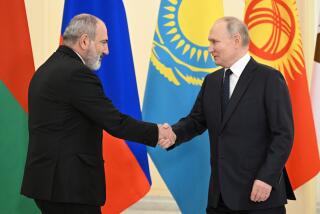SOVIET UNION / A ROLE REVERSAL : Armenia’s New Nationalist Leaders Discover That Power Means Problems
- Share via
YEREVAN, Soviet Union — The same Armenian nationalists who spent two years fighting the government are now trying to govern themselves and discovering how complicated life at the top can be.
The Karabakh Committee, Armenia’s most famous dissidents, came to power in parliamentary elections last spring and are now being appointed ministers, deputy ministers and committee chairmen in the republic’s first non-Communist government since 1922.
The new leadership, headed by President Levon Ter-Petrosyan, is now developing policies to end seven decades of a Moscow-directed economy and Kremlin-controlled politics in the southern republic. The goal is a market-based economy with a democratic, multi-party political system and an army of its own to protect its people from the neighboring Soviet republic of Azerbaijan.
Although the new leaders were eager to take their official posts, the transition has not been easy.
“It was more interesting to be a revolutionary than to do boring government work,” Ter-Petrosyan, 45, said recently.
Babken Ararktsyan, 46, a mathematician whose ardent nationalism took him into the streets, still wonders at how he became Armenia’s vice president.
Who Makes the Decisions
“I still feel a little silly in this position,” he said. “I still feel like part of the opposition--I even feel like I am in opposition to myself.”
Most of the decisions on policy will be made collectively by the small circle of intellectuals who led the nationalist movement since 1988, Ter-Petrosyan said. The Armenian All-National Movement, founded last November by the Karabakh Committee and other nationalist groups, controls the republic’s Supreme Soviet, or legislature, so the new leaders do not expect parliamentary opposition to their policies.
Unlike the previous Communist-dominated governments here, the new leaders have broad popular support, which they say is vital as the republic suffers more hardships on its way to a market economy.
Although the whole Soviet Union is facing political turmoil and economic upheaval, Armenia is a special case because of the devastating Dec. 7, 1988, earthquake and the continuing ethnic tensions with neighboring Azerbaijan over control of that republic’s Armenian enclave of Nagorno-Karabakh. Hundreds have been killed in the fighting with Azerbaijanis over the last 2 1/2 years, and about 250,000 Armenians who have fled their homes in Azerbaijan are seeking shelter here.
The strain that conflict places on Armenia’s weak economy is huge, Ararktsyan said. Periodic blockades of goods that travel through Azerbaijan by road, train or pipeline have aggravated Armenia’s hardships.
Despite the new leaders’ frustration with Azerbaijan, they have taken a less aggressive approach than they did as dissidents. Instead of criticizing Azerbaijanis, Ter-Petrosyan has traveled to Moscow to arrange meetings with their leaders.
Dealing With Problems Ahead
“A country is not an apartment,” Ararktsyan said. “When you don’t like your neighbors, you cannot switch countries like you can switch apartments.”
Before turning their attention to the economy, the new Armenian leaders had a festering, six-month-old internal problem to deal with--increasingly violent nationalist militia groups. As one of his first acts as president, Ter-Petrosyan persuaded Soviet President Mikhail S. Gorbachev not to move in Soviet troops but to let the Armenian leadership disarm the more than a dozen paramilitary groups.
The largest, the Armenian National Army, had shot and killed six people, including an Armenian legislator who was investigating whether its men had robbed several gas stations.
Most of the armed bands were formed as self-defense groups in January after a massacre of about 60 Armenians in Baku, the capital of Azerbaijan. In late August, Ter-Petrosyan passed a critical test of his ability to govern when leaders of the Armenian National Army surrendered their arms to the republic’s military authorities and called on their followers to do the same.
But the nationalists admit they have a difficult road ahead of them and their public support may decline if they fail to bring food to the stores and build houses for the hundreds of thousands of Armenians still homeless because of ethnic strife and the earthquake.
“Some people thought as soon as Ter-Petrosyan sat in his place, everything should have been perfect--enough bread, enough gasoline, enough everything,” Mager Airapetyan, 36, a construction supply manager, said. “But I say it’s better to be poor and hungry but to be rid of the Communists.”
More to Read
Sign up for Essential California
The most important California stories and recommendations in your inbox every morning.
You may occasionally receive promotional content from the Los Angeles Times.









